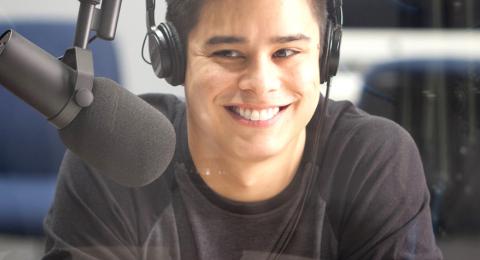The media practices option in the communication degree program will give you the hands-on training to succeed in fields such as broadcasting, videography, documentary production, screenwriting, and social media. Students gain a foundation in digital, film, and audio production and can pursue internships in areas such as digital, film, and audio media production, prior to gaining field experience in an area of their choosing. In collaboration with UNH Manchester, students access advanced equipment and studios, develop technical and interpersonal skills, and can engage with opportunities like UNH CAMRA, a digital media lab, and specialized courses in vlogging and documentary production.
What is the media practices option in communication?
Whether you’re interested in radio broadcasting, videography, vlogging, documentary production, screenwriting or social media influencing, the media practices option in the communication degree program will give you the experience and hands-on training to succeed. You’ll learn about mass media and new digital media technologies, and establish a foundation in digital, film and audio media production. Then you’ll gain field experience in an area of your choosing, such as media production, digital marketing and broadcasting, through a communication internship.
Why study media practices in communication at UNH?
The media practices option is run in collaboration with the Communication Arts Department on the UNH Manchester campus, giving you direct access to state-of-the-art equipment and studio facilities. You’ll develop the interpersonal and technical skills to produce original work. Opportunities to enhance the production curriculum include courses in vlogging, multimedia communication and short documentary production; UNH CAMRA, a student and faculty group that conducts and supports research that goes beyond the written word; the digital undergraduate journal of communication, Comm-entary; and training on Adobe Creative Cloud Suite in the Communication Media Lab on the Durham campus. Internships in audio, video and digital media production allow you to connect your scholarly training with practical experience.
Potential careers
- Audio engineer
- Communications manager
- Documentary filmmaker
- Magazine editor
- Marketing professional
- Public relations professional
- Radio producer
- Social media marketer
- Videographer
- Writer
Curriculum & Requirements
The Department of Communication, in collaboration with the Communication Arts Department at the UNH Manchester campus, offers the media practices option. This option is designed for qualified students who want to augment their communication major at Durham with training in media production and applied media communication through courses in the Communication Arts Department at the Manchester Campus.1 Qualified students who meet all requirements will graduate with a B.A. degree in communication with a media practices option, an achievement which will be recorded on their official transcripts.
Minimum Requirements for Option Eligibility
- Declared Communication Major.
- Completion of CMN 455 Introduction to Media Studies, CMN 456 Propaganda and Persuasion, and CMN 457 Introduction to Language and Social Interaction with a C or better.
- Maintain minimum in-major GPA of 2.5.
- 1
Students are responsible for their own travel arrangements between Durham and Manchester campuses.
Sample Degree Plan
This sample degree plan serves as a general guide; students collaborate with their academic advisor to develop a personalized degree plan to meet their academic goals and program requirements.
| First Year | ||
|---|---|---|
| Fall | Credits | |
| ENGL 401 | First-Year Writing | 4 |
| Language Course | 4 | |
| CMN 455 | Introduction to Media Studies | 4 |
| Discovery Course | 4 | |
| First Year Seminar | 1 | |
| Credits | 17 | |
| Spring | ||
| Language Course | 4 | |
| CMN 456 | Propaganda and Persuasion | 4 |
| Discovery Course | 4 | |
| Discovery Course | 4 | |
| Credits | 16 | |
| Second Year | ||
| Fall | ||
| CMN 457 | Introduction to Language and Social Interaction | 4 |
| Discovery Course | 4 | |
| Discovery Course | 4 | |
| Discovery Course | 4 | |
| Credits | 16 | |
| Spring | ||
| CMN 500-level Course | 4 | |
| Discovery Course | 4 | |
| Discovery Course | 4 | |
| Discovery Course | 4 | |
| Credits | 16 | |
| Third Year | ||
| Fall | ||
| CMN 500-level Course | 4 | |
| Media Practices Elective Course | 4 | |
| Minor/Elective Course | 4 | |
| Minor/Elective Course | 4 | |
| Credits | 16 | |
| Spring | ||
| CMN 500-level Course | 4 | |
| Media Practices Elective Course | 4 | |
| Minor/Elective Course | 4 | |
| Minor/Elective Course | 4 | |
| Credits | 16 | |
| Fourth Year | ||
| Fall | ||
| CMN 600-level Course | 4 | |
| CMN 600-level Course | 4 | |
| Minor/Elective Course | 4 | |
| Minor/Elective Course | 4 | |
| Credits | 16 | |
| Spring | ||
| CMN 700-level/Capstone Course | 4 | |
| CMN 600-level Course | 4 | |
| CMN 599 | Internship | 4 |
| Minor/Elective Course | 4 | |
| Credits | 16 | |
| Total Credits | 129 | |
Degree Requirements
All Major, Option and Elective Requirements as indicated.
*Major GPA requirements as indicated.
Candidates for a degree must satisfy all of the University Discovery Program requirements in addition to satisfying the requirements of each individual major program. Bachelor of arts candidates must also satisfy the foreign language proficiency requirement.
Major Requirements
Majors must complete ten courses (40 credits) with a 2.0 overall average in the major.
Major department courses may not be used to satisfy Discovery category requirements except in the case of a second or dual major.
| Code | Title | Credits |
|---|---|---|
| Required Courses | ||
| Select two introductory courses from the following: | 8 | |
CMN 455 | Introduction to Media Studies 1 | |
CMN 456 | Propaganda and Persuasion 1 | |
CMN 457 | Introduction to Language and Social Interaction 1 | |
| Communication Analysis Courses | ||
| Select three 500-level courses 2 | 12 | |
| Communication Upper-Division Electives | ||
| Select four 600/700-level courses 3 | 16 | |
| Elective | ||
| Select one elective course at any level | 4 | |
| Total Credits | 40 | |
- 1
- Majors must earn a grade of C or better in each introductory course.
- 2
- Students must complete at least one 400-level course before taking their first 500-level course. They must complete a second 400-level course before taking their second and third 500-level course.
- Students must take at least two of their 500-level courses in different thematic areas corresponding to the 400-level courses (but it is not necessary to have taken the corresponding 400-level course to enroll in the corresponding 500-level course).
- Majors must earn a grade of C- or better in all three analysis courses.
- CMN 500 Public Speaking and CMN 599 Internship cannot be used to fulfill an analysis course requirement.
- 3
- Students are eligible to take upper-division courses after successfully completing at least two of the 500-level analysis courses, each from a different thematic area.
- At least one of the student's four upper-division courses must be at the 700 level.
- Majors must earn a grade of C- or better in all upper-division courses.
- Up to four credits of CMN 795 can be used towards the major, but can only fulfill the capstone requirement with department approval.
- CMN 796 Comm-Entary Journal cannot be used to fulfill the advanced-level requirement.
| Code | Title | Credits |
|---|---|---|
| Media Practices Option Requirements | ||
| Select two courses from the following: 1 | 8 | |
CA 500 | Media Writing | |
ARTS 510 | Principles of Design | |
ARTS 611 | Animation and Motion Design | |
ARTS 612 | Interaction & Game Design | |
ARTS 613 | Design and Place | |
ARTS 614 | Design and People | |
CA 500 | Media Writing | |
CA 502 | Image and Sound (Manchester) | |
CA 512 | Screenwriting (Manchester) | |
CA 514 | Fundamentals of Video Production (Manchester) | |
CA 515 | Advanced Video Production (Manchester) | |
CA 517 | Fundamentals of Audio Prod (Manchester) | |
CA 520 | Special Topics in Applied Communication (Manchester) | |
IT 403 | Introduction to Internet Technologies | |
IT 502 | Intermediate Web Design | |
| Internship | ||
| Based on work experience at a site directly relevant to applied media practices or production completed in one semester. Junior standing is required. 2 | ||
| CMN 599 | Internship | 4 |
- 1
Students may arrange to take Media Practices (CA) courses at any time during the course of their academic programs after they have satisfactorily completed the three 400-level introductory courses. Thus, students may take the 500-level CA courses before, concurrently with, or after completion of CMN 500-level courses and/or CMN 600-level courses.
- 2
Visit our Internships webpage for procedures on how to arrange internships.
Capstone Requirement
The Discovery Program Capstone requirement may be fulfilled by completing any 700-level communication course except CMN 796. CMN 795 can only fulfill the capstone requirement with department approval and can be repeated for a maximum of 8 credits.
Additional Information
- A maximum of 8 credits of CMN 795 Independent Study may be counted toward the major.
- CMN 799H and CMN 796 cannot be used to fulfill an advanced course requirement.
Transfer students
Must complete 20 credits of their communication coursework at UNH to complete the major satisfactorily. Exchange students may transfer no more than 10 approved credits from another institution to be applied toward completion of the communication major at UNH.
Program Learning Outcomes
Students will be able to describe the Communication discipline and its central questions. We expect students to be able to:
- Explain and synthesize the history of Communication theory.
- Articulate the differences between approaches within the discipline (media studies, language and social interaction, and rhetorical studies).
- Identify contemporary debates within the field.
- Distinguish Communication scholarship from other areas of study.
- Understand the role of Communication scholarship in society.
- Articulate the relevance of communication in civic life, including an ability to apply key concepts in the field to world events, situations, or problems.
Students will be able to think critically about communication processes by applying communication theories and concepts. We expect students to be able to:
- Identify theories, perspectives, principles, and concepts relevant to the discipline.
- Recognize academic writing, identify the work’s thesis, explain its method, assess the evidence used, and determine its significance.
- Engage with communicative patterns, processes, problems, and practices that they encounter in their personal, professional and civic lives.
- Acquire effective frameworks for describing, analyzing, reflecting upon, and engaging with those patterns, processes, problems, and practices.
Prepare students to become thoughtful and proficient communicators. We expect students to be able to:
- Become critical consumers of messages.
- Understand how meanings are constructed by speakers and audiences.
- Evaluate claims and arguments, and to be able to explain how they are grounded.
- Recognize the collaborative construction of meaning and its relation to social change.
- Explore the ways in which various forms of communication constitute, maintain, and transform social life.
- Formulate coherent arguments/theses, provide support for their perspectives, and communicate them clearly and logically.
- Select creative and appropriate modalities and technologies to accomplish communicative goals.
- Adapt messages and coordinate communication with others recognizing the diverse needs.





